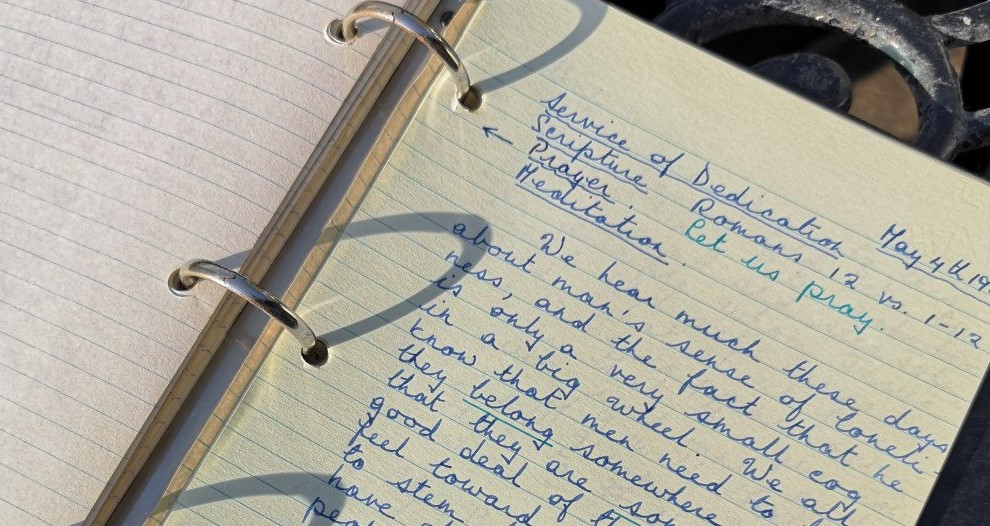Leaving something written…
A couple of weeks ago my four siblings and I gathered at our family home to have our last weekend of clearing, sorting, dividing up, keeping and throwing away. It really does bring to mind Ecclesiastes 3, especially as my wonderful mother collected more rocks and stones than anyone I know and now many of them are scattered among her five children and her twenty grandchildren! It was the last time we all slept under that roof, the last time we all had dinner together around that table in that home. We cried, of course, and laughed (because we always laugh a lot), and we admitted to each other that we were all pretty knackered.
My parents were squirrels. They kept, it seems, pretty much everything. This was only the last weekend in a series of days and days that we’d gone to London to sort and sort. I wouldn’t have missed those days though, despite the exhaustion and the emotion. I loved finding all that we found. I kept stopping, sitting down and reading through some of the treasures I’d found, sharing them with my sister and brothers and them passing things to me.
It made me think how sad it’s going to be for the next generation who are going to find so little that is written down – in letters, in notebooks, in newspaper cuttings, in the margins of books. So much of what we’ve discovered about our parents, and grandparents, and great grandparents is in what they wrote and what was written to them, and what they kept in drawers, boxes, suitcases, albums.
We should write – I say this to myself – we could print out things that we write on our computers, but we should write – on paper, in our own hand. I love my parents’ handwriting. I love what it says to me about their personalities and their thoughts and their loves. I love seeing what they crossed out and rewrote. We should write.
My mother was a prolific writer. We haven’t even begun to work through her journals and notebooks, but a few months ago I came across a little folder of theological reflections from her time at Smith College, where she studied literature and theology, and I tucked it away to bring home before putting it back for the others to read. Realizing that I had to bring it back for our final weekend I sat down to read through. I’d just finished writing one of my New Wine talks on 1 Corinthians 12-14 and I opened up my mother’s notebook to a talk that she had given when she was 22 years old at Smith College, on Romans 12.
I’ve always felt my father, who was a sharp-witted lawyer, trained us not to be sloppy in our thinking, but as I read Mum’s meditation, I realized all over again that it was my mother who had trained us in our faith. Before we had our last dinner in our home the five of us gathered for a little service in the sitting room where my mum used to lead our ‘family services’ when we all refused to go to church any more. I’m not sure they lasted more than about 10 minutes! Perfect really for her five undisciplined children. My parents weren’t much into discipline, more just books. I read her meditation and the prayer that she had written just over 60 years ago that seemed to have been written just for us, just for that evening. In reality, I think it must have been a leavers’ service, where she, a thoughtful, intelligent ‘bluestocking’ (as she jokingly called herself!) must have been asked to speak. She always used to talk about Dick Unsworth, the chaplain at Smith. She adored him and he was a huge influence in her life. I think he must have asked her to speak and I suspect he was very proud of her.
I share what she wrote exactly as she wrote it.
May 4th, 1959
Service of Dedication
Prayer: Let us pray
Meditation
We hear much these days about man’s sense of loneliness, and the fact that he is only a very small cog in a big wheel. We all know that men need to feel they belong somewhere, and that they are someone. A good deal of the hostility men feel toward each other seems to stem from the fear they have of being inferior to other people, of being less capable, or less well loved. How many times do we torture ourselves with senseless and futile comparisons with others? “She’s so much more intelligent that I am,” or “I wish I had her gift of organisation,” “her understanding is so much greater than mine,” and even, “her faith is so much greater than mine.”
Our Lord speaks to this when, having told Peter to “follow him,” Peter turns around and sees John, “the disciple whom Jesus loved,” and asks Jesus, “Lord, what about this man?” Jesus points out to Peter that this question is quite irrelevant, and says, “If I will that he tarry till I come, what is that to thee? Follow me.”
St Paul, in his wonderful description of the Christian community deals quite fully with this problem, of which he is just as aware as any psychologist or sociologist today. And the answer he gives is a very simple and a very realistic one.
No, he tells us, we are not all equal, and we may as well accept the fact. He admonishes us not to think more highly of ourselves than we ought, but “to think with sober judgment,” to recognize that we have gifts that differ according to the grace given to us, and that God chooses to use us in different ways. Some of us have a greater faith than the rest of us, some of us are more articulate about Christian doctrine than others, some of us are in a better position to contribute materially than others, and some of us can serve better through ministering in the world, where others minister through prayer or through the ministry.
The wonderful thing about the Christian community is that one needs no special talent to belong, nor is it something which one joins. By the very fact that we accept Jesus Christ as Lord we belong to the body of Christ, which is the Christian community.
It is within this community that all men are equal, because they are equal in the sight of God, and all men are free, because they are free to be what they are; they are free because each man’s innate dignity and unique contribution are recognized, and they are free to use their own gifts as they accept and recognize the gifts of others, giving thanks to God that each one can serve him, and that they can serve one another.
“we, though many, are one body in Christ, and individually members one of another.” The most sophisticated theologian is one with the man whose faith is naïve and simple; they are both needed, and each can learn from the other. Each one has a unique and necessary contribution to make, for the Christian community is a growing community, where men can grow in faith and knowledge, and understanding.
St Paul makes it quite clear that all of us have been endowed by the grace of God with certain gifts, and that we must recognize them as gifts, and use them in the service of God and our neighbour. “Having gifts that differ according to the grace given us, let us use them; … he who contributes, in liberality, he who gives aid, with zeal; he who does acts of mercy, with cheerfulness.” Having said this, St Paul goes on to the most important part of his message, a part which needs no explanation.
“Let love be genuine. Hate what is evil; hold fast to what is good; love one another with brotherly affection; outdo one another in showing honor. Never flag in zeal, be aglow with the Spirit, serve the Lord. Rejoice in your hope, be patient in tribulation, be constant in prayer.”
One gift we have all been given equally, and in abundance – the capacity to love, because God first loved us. And it is this love which distinguishes the Christian community from any other, which enables it to accept men for what they are, and which allows them to fulfil themselves. This is no wishy-washy, sentimental kind of love, but an understanding, vital, and active one. It is this love which empowers us to serve, and to which all other gifts are subordinate.
I should like to close by reading from Paul’s Epistle to the Corinthians Ch. 13.
Prayer
Almighty and eternal God, who hast shown Thy concern for all people through Thy Son, Jesus Christ, and hast commanded us to carry on his work, be present, we pray Thee, as we meet tonight. Sanctify and redeem, O Lord, the work of the past year, that Thou mayest use it for Thy will; bless those who carry on Thy work for the coming year, that it may be done in Thy name in whom alone do all things come to fulfilment. To all of us, those who remain and those who go, grant we pray Thee, a clear knowledge of Thy will, and a faith in Thee that is strong and enduring that, to whatever purpose Thou mayest call us, we may follow knowing Thou art with us always.
Claire Davidson



